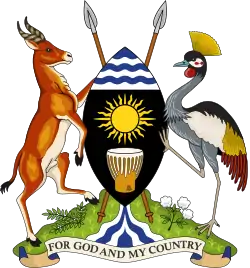Ministry of Justice and Constitutional Affairs (Uganda)
The Ministry of Justice and Constitutional Affairs is a cabinet-level government ministry of Uganda. It is responsible for the provision of "legal advice and legal services to government, its allied institutions and to the general public and to support the machinery that provides the legal framework for good governance".[1] The ministry is headed by a cabinet minister, currently Hon. Ephraim Kamuntu who came to office in a mini cabinet reshuffle on 14 December 2019
 Coat of Arms of Uganda | |
| Ministry overview | |
|---|---|
| Type | Ministry |
| Jurisdiction | Government of Uganda |
| Headquarters | 1 Parliament Avenue Kampala, Uganda |
| Ministry executive |
|
| Website | Homepage |
Location
The headquarters of the ministry are located at 1 Parliament Avenue, in the Central Division of Kampala, the capital and largest city of Uganda.[1] The coordinates of the ministry headquarters are: 0°18'47.0"N, 32°35'10.0"E (Latitude:0.313056; Longitude:32.586111).[2]
Constitutional mandate
The Ministry of Justice and Constitutional Affairs is empowered to carry out the following functions:[1]
- To represent the government of Uganda in civil suits for and against the government
- To carry out legal advisory services, including the drafting, perusal and clearance of contracts and treaties. It also has the authority to provide legal opinion on government borrowing
- To draft bills and statutory instruments
- To regulate the legal profession and legal education
- To administer estates of the deceased, people with unsound minds and if missing persons
- To collect non-tax revenue
List of ministers (Independence in 1962-present)
- Grace K. Ibingira[3] (1962-1964) [1st Minister of Justice]
- Cuthbert Joseph Obwangor [4][5][6] (1964-1966)
- Peter James Nkambo Mugerwa [7] (1971-1973)
- Godfrey Serunkuma Lule [8][9] (1973-1977)
- Dani Wadada Nabudere [10] (1979)
- Edward Ogbal[11] (1979-1986)
- Joseph Mulenga (1986-1989)
- George Kanyeihamba [12][13] (1989-1990)
- Abu Mayanja [14][15] (1990-1994)
- Joseph Ekemu[16] (1994-1996)
- Bart Magunda Katureebe [17][18] (1996-1998)
- Joshua S. Mayanja-Nkangi [19] (1998-2001)
- Janat Mukwaya [20][21][22] (2001-2003) [1st female]
- Amama Mbabazi (2004-2006)
- Kiddu Makubuya [23] (2005-2011)
- Kahinda Otafiire [24] (2011–present)
See also
References
- GOU (10 October 2016). "Ministry of Justice and Constitutional Affairs: About the Ministry". Kampala: Government of Uganda (GOU). Retrieved 10 October 2016.
- Google (10 October 2016). "Location of the Uganda Ministry of Justice and Constitutional Affairs" (Map). Google Maps. Google. Retrieved 10 October 2016.
- "Uganda's first cabinet ministers in 1962". Daily Monitor. 3 August 2012.
- (1952-), International Commission of Jurists (1964). Bulletin.CS1 maint: numeric names: authors list (link)
- Uganda (1966). The Constitution of Uganda, 15th April, 1966. Govt. printer.
- Assembly, Uganda National (1965). Official Report.
- Uganda (1971). The Uganda Gazette. Government Printer.
- The Uganda Law Focus. Law Development Centre. 1972.
- "Chiefs of State and Cabinet members of foreign governments / National Foreign Assessment Center. 1977:Jan.,Mar." HathiTrust. Retrieved 24 June 2018.
- "Prof. Nabudere is dead". Daily Monitor. Retrieved 24 June 2018.
- Who's who in Uganda. Fountain Publishers.
- "Chiefs of State and Cabinet members of foreign governments / National Foreign Assessment Center. 1990 no.1-6". HathiTrust. Retrieved 24 June 2018.
- Hayner, Priscilla B. (2001). Unspeakable Truths: Confronting State Terror and Atrocity. Psychology Press. ISBN 9780415924788.
- "Chiefs of State and Cabinet members of foreign governments / National Foreign Assessment Center. 1991July-Dec". HathiTrust. Retrieved 24 June 2018.
- Uganda Confidential. Uganda Confidential. 1993.
- "Chiefs of State and Cabinet members of foreign governments / National Foreign Assessment Center. 1995Jan-Apr 1995". HathiTrust. Retrieved 24 June 2018.
- "Chiefs of State and Cabinet members of foreign governments / National Foreign Assessment Center. Jan-Mar 1998". HathiTrust. Retrieved 24 June 2018.
- Countries of the World and Their Leaders Yearbook. Gale Research Company. 1997.
- "Chiefs of State and Cabinet members of foreign governments / National Foreign Assessment Center. Oct-Dec 2000". HathiTrust. Retrieved 24 June 2018.
- "Chiefs of State and Cabinet members of foreign governments / National Foreign Assessment Center. Sept. -Dec. 2001, inc." HathiTrust. Retrieved 24 June 2018.
- "Chiefs of State and Cabinet members of foreign governments / National Foreign Assessment Center. Jan. -Apr. 2002". HathiTrust. Retrieved 24 June 2018.
- Turner, B. (7 February 2017). The Statesman's Yearbook 2005: The Politics, Cultures and Economies of the World. Springer. ISBN 9780230271333.
- Your Rights: The Uganda Human Rights Commission Monthly Magazine. The Commission. 2007.
- "Minister of Justice and Constitutional Affairs | Ministry of Justice and Constitutional Affairs". www.justice.go.ug. Retrieved 24 June 2018.